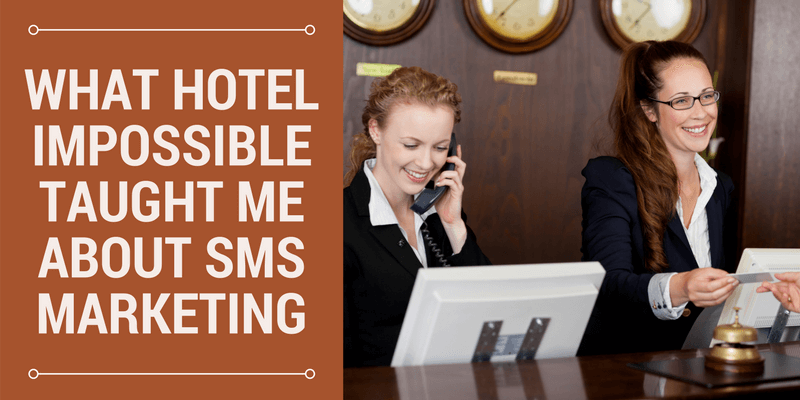Why SMS is the Biggest Missed Opportunity for Marketing to Millennials

With the continued rise of different and more diverse technologies in the social and mobile web, it would be easy to dismiss the potential benefits of SMS marketing – and that’s exactly the reason you shouldn’t. An SMS is the unexpected visit of a familiar friend, and there’s one demographic that embraces an old trusted ally in this new, noisy digital world more than anyone else: the millennials.
Trust is a currency in the modern world; if a marketing message doesn’t feel genuine or it feels intrusive, the consumer will switch off and move on. You only have to look at the rise of ad blockers online as an example of this. The real goal of great marketing is for the recipient to feel valued and personally attended to, and it seems that SMS marketing has more potential here than perhaps meets the eye.
Less Invasive, More Personal
According to a recent survey of 500 millennials in the US by OpenSource, more than three quarters of millennials prefer to receive texts from a company than a call, while just as many feel that business text messaging is less invasive than other forms of messaging. Meanwhile over half of those surveyed believe that SMS is the most convenient way to be reminded of something – it’s unobtrusive and they can deal with it in their own time.
In other words, the beauty of SMS services is in providing everything that millennials like about a good online user experience – the convenience, the non-invasiveness and the personal touch of having a message beamed to your phone, to be used as, when and where it’s needed.
This ethos comes into its own when business SMS messaging plays to these strengths. For example, the OpenSource survey found that 75% of millennials find reminders of appointments, coupons, promotions and deliveries amongst the most useful aspects, with 57% saying that it offers ‘one less thing to remember’.
SMS marketing fills gaps that other types of electronic messaging cannot. It is inherent of their simplicity that they augment a shopping experience for consumers.
A Non-Traditional Platform
Their engagement potential also extends to the fact that they’re familiar. In this ever evolving digital world, the non-traditional methods of marketing are now the norm. An SMS is a familiar, old friend that confers trust, value and individual attention.
One in five millennials feel texts are more personal, and it’s not hard to imagine why when we all have one eye fixed firmly on several minute-by-minute news feeds of the world’s happenings. A well-timed text could feel like a refreshing respite.
What is it About Millennials
So what is it about millennials? Why could this group in particular be amenable to a text message provider?
Well, first it should be said that the millennial demographic covers a fairly wide range of people, currently in their 20s and 30s. But they do share striking commonalities, not least because it is this group that has the unique insight of experiencing the cusp of the digital revolution. They remember a time when there were no mobile phones at all, and a time when mobile phones were the size of breeze blocks; they witnessed the revelatory birth of the text message; they saw the internet born, social media develop and diversify and subsequently saw everything mobilised on a smartphone. No other generation has bore witness to such transformative developments. And as is plain to see, text-based messaging has been utterly instrumental in that transformation.
Having seen all that first hand, nowadays millennials check their phones on average 85 times a day and use it for about five hours – a third of the time the average person is awake – according to a study last year by Nottingham Trent University. And interestingly, more than half of these uses last 30 seconds or less. That 30 seconds might only be to see what social media notification you’ve received since you last looked, five minutes ago, but that’s also prime time to digest an unexpected text.
The Big Opportunity
And the text will be unexpected. A very recent OpenMarket and Internet Retailer magazine survey report reveals the extent to which SMS messaging is under-utilised by marketers. Their survey showed that 97% of internet retailers use email marketing, and 82% use social media marketing. Comparatively, just 29% use business texting. That’s a big missed marketing opportunity for something that can hold so much value for the millennial generation.
So how does one market to millennials? While the value of a reminder or exclusive offer is clear, it is because of their unique position in history that there are more fundamental trends about the millennial generation and the kind of messaging that resonates.
A survey in October last year of 1000 millennials across 125 countries, by the World Economic Forum’s Global Shapers Community, revealed some valuable insights about what is important to this generation. Of course, while your SMS marketing strategy will have to be tailored to your specific business needs, these are points to bear in mind for engaging the millennial audience.
Issues of inequality and environment are of paramount importance, and millennials want to be able to make a difference. This, followed by the opportunity for valuable personal development, are the primary aspects that govern their career choices, for example.
What this means in marketing terms is that the millennial generation is more emotively driven, and more giving. It’s part of the reason the sharing economy and social media continue to be so successful.
In other words, branded messaging that strikes an emotional chord resonates with this generation. They don’t mind where the message comes from, as long as it gels with their thinking. Add to that the clear value and personality this generation feels with SMS in general, and it’s clear this can be a winning platform for the savvy marketer. And the best thing is that very few companies have thought to take advantage of this. It’s time to rethink sending that text.
Related Articles
9 High Conversion Power Words for SMS Marketing
What Hotel Impossible Taught Me about SMS Marketing
In Hotel Impossible, Anthony Melchiorri saves struggling hotels. It turns out some of the advice he gives them could make you a lot more money. It’s all about marketing and knowing where to get the best ROI. Read the blog to see if you’re spending in the right places.
Insights Into The Best SMS Marketing
It’s been said that to be successful at something, you need to find someone that’s already done what you want to do, then emulate them. You don’t need to create or rewrite the rulebook every time. This is true of marketing too. While it’s a creative field, there are tried and true examples of what works. This is why case studies are so important to helping you understand how something like SMS marketing can work for you.
5 Winter Phrases for SMS Marketing [Infographic]
5 Things To Consider Before Launching Your First Text Marketing Campaign
SMS is well established as a successful marketing channel - however that doesn't mean you should just dive in head first. Here's five things you should consider before launching your first SMS marketing campaign.
7 Statistics That Show Why You Should be Using SMS Marketing Right Now
You might have heard about SMS marketing and thought it wasn't for you. Maybe you're unconvinced by this method of reaching customers and are just not sure it could help your business thrive. But any business, big or small, can benefit from an online SMS service and the facts are plain to see.










